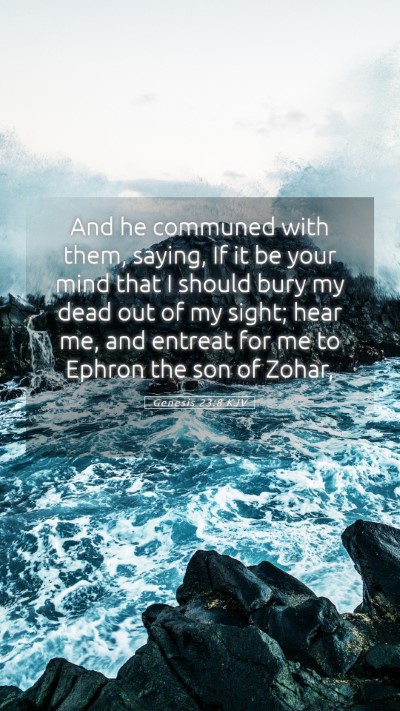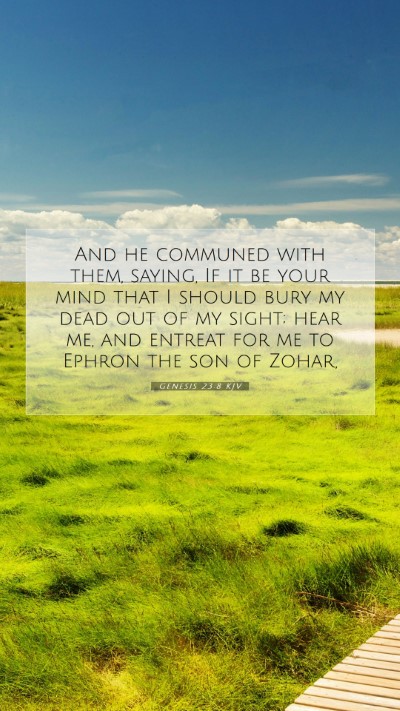Understanding Genesis 23:8
Genesis 23:8 states: "And he spake unto them, saying, If it be your mind that I should bury my dead out of my sight; hear me, and entreat for me to Ephron the son of Zohar." This verse illustrates a critical moment in Abraham's life as he seeks a burial place for Sarah, his beloved wife. It not only reflects personal grief but also highlights important cultural and social aspects of ancient customs surrounding death and burial.
Verse Context and Setting
This verse is situated within the narrative of Abraham's life, emphasizing the transition in his journey as he settles in the land of Canaan. Scholars like Matthew Henry observe that Abraham's request to the Hittites for a burial site reveals his status as a sojourner amidst a people who held the land. The act of negotiating for land signifies Abraham's deep-rooted faith and sense of belonging to God's promise.
Commentary Insights
- Matthew Henry: Henry emphasizes the emotional weight behind Abraham's words as he navigates the complex landscape of mourning and burial rights. He notes the implications of such discussions with the Hittites, underscoring Abraham's respectful approach in seeking a suitable burial place.
- Albert Barnes: According to Barnes, the significance of having a designated burial site is monumental. It illustrates not just physical possession but a testament of faith in God's promises concerning the land. In this light, the act of asking reflects hope and expectation for future generations.
- Adam Clarke: Clarke identifies the underlying themes of honor and dignity in the context of burial practices. He suggests that Abraham's request serves as an example of demonstrating respect for the deceased, indicative of both personal loss and cultural propriety within the ancient Near Eastern context.
Biblical Exegesis and Application
This verse serves as a pivotal example of how individuals navigate cultural interactions and the importance placed on burial practices in biblical times. It opens discussions relevant to modern readers in the contexts of mourning, legacy, and care for loved ones. The meticulous approach Abraham takes in this verse is a blueprint for understanding how to address sensitive matters with reverence and dignity.
Applications to Daily Life
Reflecting on Genesis 23:8 encourages believers to consider how they honor those who have passed in their own lives. The quest for a proper farewell that Abraham undertakes speaks volumes about valuing relationships and fulfilling promises—even when faced with grieving and loss.
Related Biblical Cross References
- Genesis 17:8 - God's promise of land to Abraham and his descendants.
- Genesis 49:30-31 - Abraham's burial site significance outlined in the context of family legacy.
- Genesis 25:9 - The burial of Abraham and Sarah, linking back to this foundational moment.
Conclusion
Engaging with Genesis 23:8 through various commentaries and scholarly insights enriches our understanding of this passage. It provides valuable lessons on how to conduct ourselves with respect and sensitivity in matters of loss and memorialization. The broader implications echo throughout Scripture, reaffirming the importance of legacy and the connection between past, present, and future generations.


